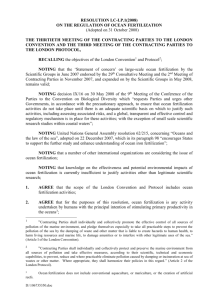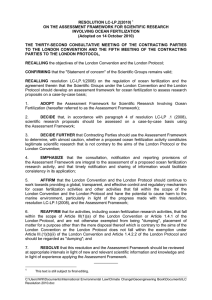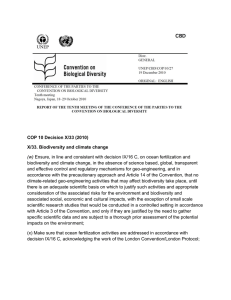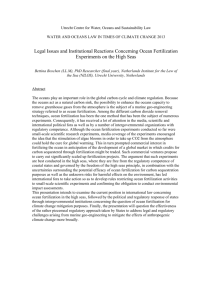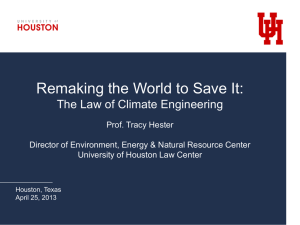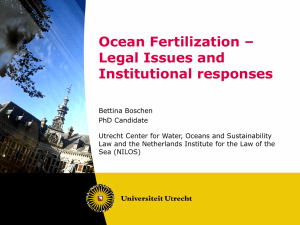(Adopted on 31 October 2008) RESOLUTION LC-LP.1(2008)
advertisement
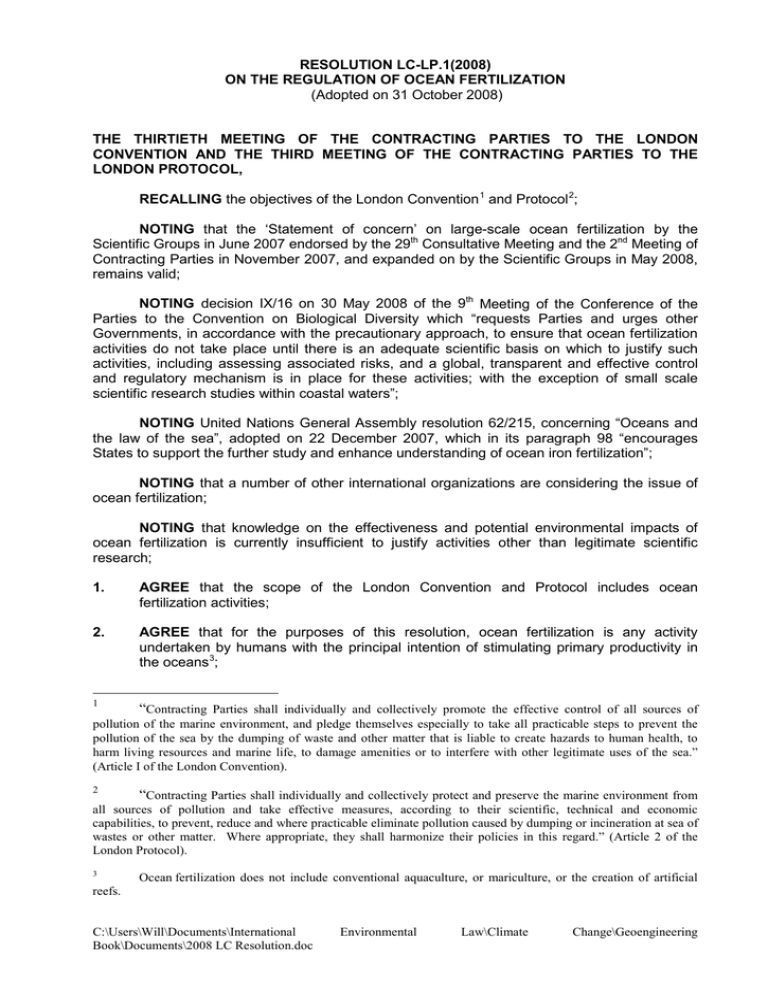
RESOLUTION LC-LP.1(2008) ON THE REGULATION OF OCEAN FERTILIZATION (Adopted on 31 October 2008) THE THIRTIETH MEETING OF THE CONTRACTING PARTIES TO THE LONDON CONVENTION AND THE THIRD MEETING OF THE CONTRACTING PARTIES TO THE LONDON PROTOCOL, RECALLING the objectives of the London Convention 1 and Protocol 2; NOTING that the ‘Statement of concern’ on large-scale ocean fertilization by the Scientific Groups in June 2007 endorsed by the 29th Consultative Meeting and the 2nd Meeting of Contracting Parties in November 2007, and expanded on by the Scientific Groups in May 2008, remains valid; NOTING decision IX/16 on 30 May 2008 of the 9th Meeting of the Conference of the Parties to the Convention on Biological Diversity which “requests Parties and urges other Governments, in accordance with the precautionary approach, to ensure that ocean fertilization activities do not take place until there is an adequate scientific basis on which to justify such activities, including assessing associated risks, and a global, transparent and effective control and regulatory mechanism is in place for these activities; with the exception of small scale scientific research studies within coastal waters”; NOTING United Nations General Assembly resolution 62/215, concerning “Oceans and the law of the sea”, adopted on 22 December 2007, which in its paragraph 98 “encourages States to support the further study and enhance understanding of ocean iron fertilization”; NOTING that a number of other international organizations are considering the issue of ocean fertilization; NOTING that knowledge on the effectiveness and potential environmental impacts of ocean fertilization is currently insufficient to justify activities other than legitimate scientific research; 1. AGREE that the scope of the London Convention and Protocol includes ocean fertilization activities; 2. AGREE that for the purposes of this resolution, ocean fertilization is any activity undertaken by humans with the principal intention of stimulating primary productivity in the oceans 3; 1 “Contracting Parties shall individually and collectively promote the effective control of all sources of pollution of the marine environment, and pledge themselves especially to take all practicable steps to prevent the pollution of the sea by the dumping of waste and other matter that is liable to create hazards to human health, to harm living resources and marine life, to damage amenities or to interfere with other legitimate uses of the sea.” (Article I of the London Convention). 2 “Contracting Parties shall individually and collectively protect and preserve the marine environment from all sources of pollution and take effective measures, according to their scientific, technical and economic capabilities, to prevent, reduce and where practicable eliminate pollution caused by dumping or incineration at sea of wastes or other matter. Where appropriate, they shall harmonize their policies in this regard.” (Article 2 of the London Protocol). 3 Ocean fertilization does not include conventional aquaculture, or mariculture, or the creation of artificial reefs. C:\Users\Will\Documents\International Book\Documents\2008 LC Resolution.doc Environmental Law\Climate Change\Geoengineering 2 3. AGREE that in order to provide for legitimate scientific research, such research should be regarded as placement of matter for a purpose other than the mere disposal thereof under Article III.1(b)(ii) of the London Convention and Article 1.4.2.2 of the London Protocol; 4. AGREE that scientific research proposals should be assessed on a case-by-case basis using an assessment framework to be developed by the Scientific Groups under the London Convention and Protocol; 5. AGREE that the aforementioned assessment framework should include, inter alia, tools for determining whether the proposed activity is contrary to the aims of the Convention and Protocol; 6. AGREE that until specific guidance is available, Contracting Parties should be urged to use utmost caution and the best available guidance 4 to evaluate the scientific research proposals to ensure protection of the marine environment consistent with the Convention and Protocol; 7. AGREE that for the purposes of this resolution, legitimate scientific research should be defined as those proposals that have been assessed and found acceptable under the assessment framework; 8. AGREE that, given the present state of knowledge, ocean fertilization activities other than legitimate scientific research should not be allowed. To this end, such other activities should be considered as contrary to the aims of the Convention and Protocol and not currently qualify for any exemption from the definition of dumping in Article III.1(b) of the Convention and Article 1.4.2 of the Protocol; 9. AGREE that this resolution should be reviewed at appropriate intervals in light of new and relevant scientific information and knowledge. __________________ 4 Such guidance includes, but is not limited to: previous agreements of the Consultative Meetings/Meetings of Contracting Parties; Annex III to the London Convention and Annex 2 to the London Protocol; the considerations for evaluating ocean fertilization proposals developed by the Scientific Groups (LC/SG 31/16, annex 2, appendix 3); and the Revised Generic Waste Assessment Guidance (LC 30/16). C:\Users\Will\Documents\International Book\Documents\2008 LC Resolution.doc Environmental Law\Climate Change\Geoengineering
